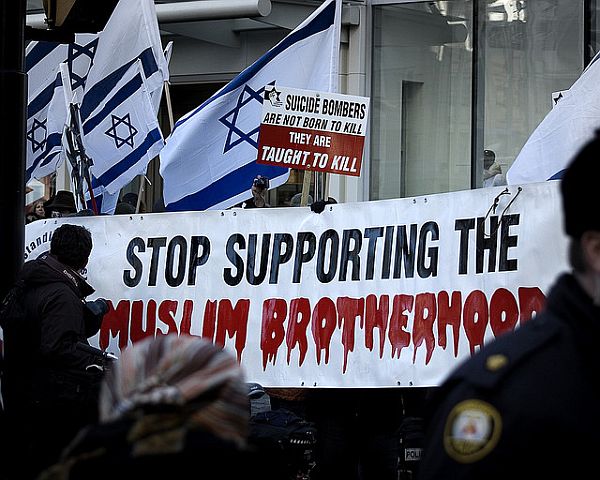
Frank Gaffney’s Center for Security Policy, in a report released last week, breathlessly warned that: “real progress [is] being made by the Muslim Brotherhood in insinuating shariah into the very heartland of America through stealthy means.”
Nathan J Brown knows a lot more about the Islamist organization than do the anti-shariah crusaders, and he says the international Muslim Brotherhood is “a group of loosely linked, ideologically similar movements that recognize each other, swap stories and experiences in occasional meetings, and happily subscribe to a formally international ideology without giving it much priority.”
[A]wareness of Islamist movements in the West has lead to some dark talk of an international Brotherhood that serves as a cover for all sorts of missionary, political, and even violent activity. From a solid core in the Arab world, the Brotherhood’s tentacles are said to be reaching out from Oslo to Oklahoma City.
I have conducted little research on the Brotherhood in Europe and the United States, but I have studied it in various Arab countries where the movement is the strongest and most active. Is there such a thing as an international Muslim Brotherhood uniting these branches? Yes. But the odd truth is that the international Brotherhood does not matter much. And perhaps the odder truth is that it does not seem to matter that the international Muslim Brotherhood does not matter.
[…]
Why does this international organization not matter? Because it has not (and probably cannot) do very much. First, it is sluggish and unresponsive. On the few occasions it has been called in to settle difficult organizational questions, it has not responded with efficiency or alacrity. For instance, in 1989 a dispute among Jordanian Brotherhood members about whether to accept an invitation to join the cabinet proved so contentious the disputants tried to kick the question upstairs to the international organization. The answer came far too late and contained too much ambiguity to resolve the issue. In 2007, Khalid Mish’al sought to have Hamas recognized as a distinct member of the international organization, setting off a complex organizational tussle inside the Jordanian organization. (Hamas has largely subsumed the Palestinian Brotherhood, which in turn was formally attached in the eyes of the international organization to the Jordanian branch — and some vestigial links survive between Hamas and the Jordanian Brotherhood as a result). One chief bone of contention focused on what would happen to Palestinian and Jordanian members in the Gulf (an important source of funds but also a group that sent representatives to the leadership bodies of the Jordanian organization, tilting it in a Palestinian direction). Three years later, the issues are still not fully resolved.Second, the international organization is not only sluggish, it is also Egyptian dominated. Its leader is always an Egyptian and Egyptian Brotherhood members have scoffed at the idea that a non-Egyptian might be selected. Badi’s election was approved by the international organization, but there was some grumbling about the rubber-stamp nature of the process. Most members do accept that the “mother organization” will inevitably have a leading role, but many also find the Egyptian leaders far more interested in Egyptian than international affairs. Egypt’s harsh security climate also hampers its leaders from becoming more active internationally — many Egyptian leaders cannot travel outside their country.
Finally, various chapters of the Muslim Brotherhood have developed an ethos of mutual deference: they increasingly hold fast to the idea that each chapter should be free to react as it sees fit to local conditions. The various chapters do consult each other, but they are free to reject the advice they receive. The Iraqi Islamic Party participated in a political process sponsored by the United States at a time when Jordan’s Muslim Brotherhood refused contact with American officials because of the country’s occupation of Iraq. Aware of the conflicting stances, leaders of both organizations simply agreed to disagree. Hamas was advised by both Jordanian and Egyptian leaders not to try too hard in the 2006 parliamentary elections. “Participation, not domination” (that is, run but do not win) was the formula suggested to them. They listened to the first half of the message (they ran), but not the second (they won). Unlike their Jordanian and Egyptian comrades who only contest a minority of seats, they submitted a complete slate of candidates for parliamentary seats, enabling their surprising (and in the eyes of some Brotherhood leaders elsewhere) ill-advised victory.

